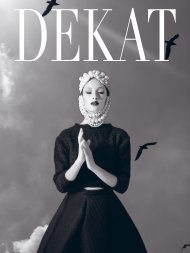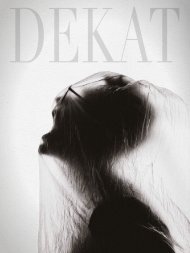1
You also want an ePaper? Increase the reach of your titles
YUMPU automatically turns print PDFs into web optimized ePapers that Google loves.
The illustration to rubai number 71 from Fitzgerald’s second edition inspired two separate works in this area. The illustration is of a turbaned man, who resembles a magician, holding<br />
a flaming torch in one hand and in the other, a spiked orb topped with a five-pointed star nestled in a crescent moon.<br />
I sent my Soul through the Invisible,<br />
Some letter of that After-Life to spell:<br />
And after many days my soul return’d<br />
And said, Behold, Myself am Heav’n and Hell<br />
The torch appears to represent hell while the star and crescent, the symbol of Islam, is heaven. However, the message of the rubai suggests that both these concepts are merely<br />
reflections of human anxieties and are states that emanate from within the human consciousness. This message would have been incredibly liberating to someone brought up<br />
according to strict Calvinist principles. It would also have been shockingly heretical to many in a small, Afrikaner community at the time.<br />
The turbaned magician appears in bas-relief on the top of a table and is one of the figures on the frieze. The star and crescent moon at the top of his orb has been constructed<br />
separately from leaded glass and tin and is attached to the frieze by a wire. This is the star and crescent moon visible from the sitting room through the amber window pane. Viewed<br />
from the other side of the glass inside the house, it forms part of a totally different visual construct and conjures up associations divorced from the poem.<br />
To the right of a green, glass-encrusted door opening from the Green Room is a particularly beautiful bas-relief inspired by Sheriffs’ illustration of rubai number 57, showing a pair<br />
of embracing lovers. It’s flanked by the Mona Lisa on the adjoining wall.<br />
You know, my Friends, how bravely in my House<br />
For a new marriage I did make Carouse:<br />
Divorced old barren Reason from my Bed,<br />
And took the Daughter of the Vine to Spouse.<br />
Rubai number 57 carries an epicurean message, celebrating enjoyment of the senses. This is also in stark contrast to the Calvinistic tendency towards abstinence and moral<br />
stricture.<br />
188 FOR THE LOVE OF LIGHT<br />
FOR THE LOVE OF LIGHT 189





